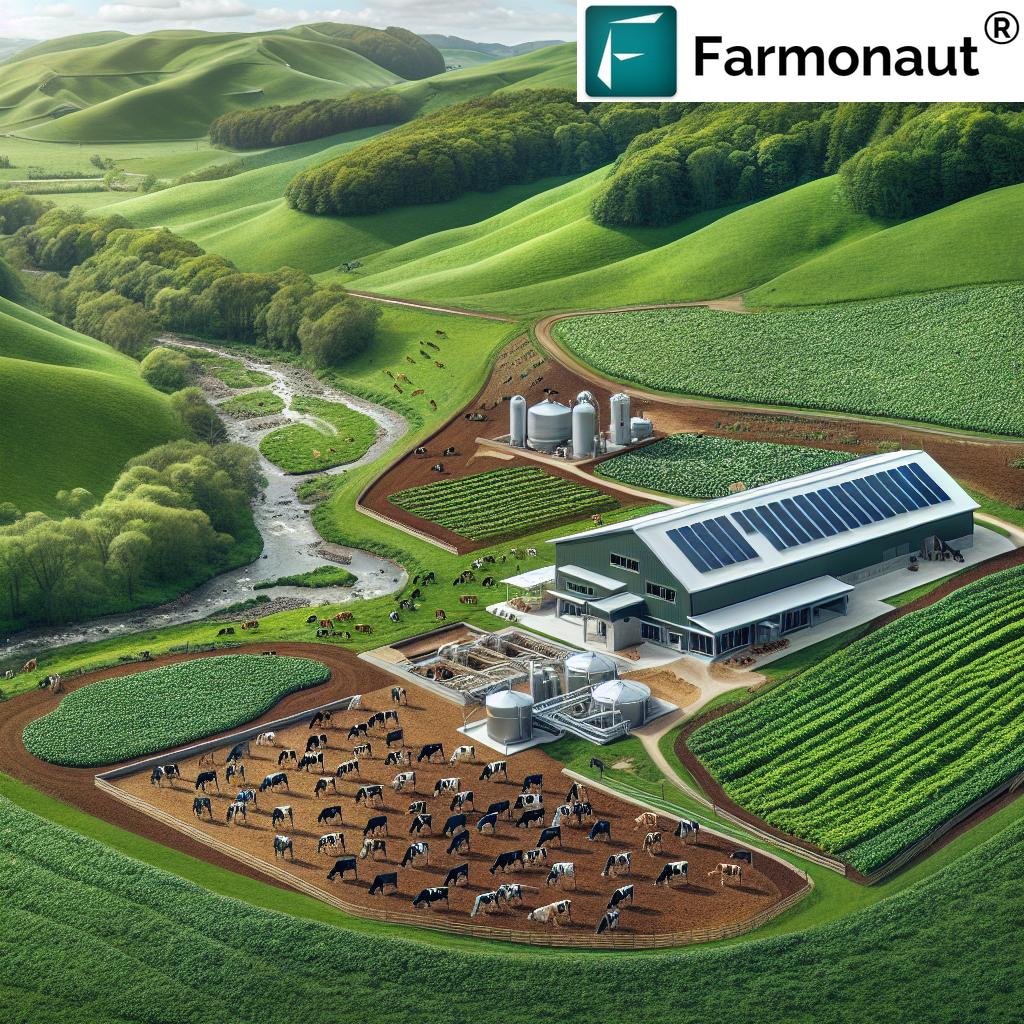Canadian Dairy Farmers: Pioneering Sustainable Agriculture for a Net-Zero Future
“Canadian dairy farmers aim to achieve net-zero emissions by 2050, showcasing their commitment to sustainable agriculture.”
Welcome to our comprehensive exploration of how Canadian dairy farmers are leading the charge in sustainable agriculture. As we delve into this topic, we’ll uncover the innovative practices, cutting-edge research, and unwavering commitment that are propelling the Canadian dairy industry towards a net-zero future. Join us as we examine the multifaceted approach these farmers are taking to ensure environmental stewardship while maintaining the highest standards of food safety and quality.

The Path to Sustainability in Canadian Dairy Farming
Canadian dairy farmers are at the forefront of sustainable agriculture, embracing a holistic approach that encompasses everything from soil health to animal welfare. Let’s explore the key areas where these farmers are making significant strides:
- Regenerative Agriculture Techniques
- Water Conservation Methods
- Carbon Reduction Efforts
- Biodiversity Enhancement
- Proactive Animal Care Initiatives
Each of these areas plays a crucial role in the overall sustainability of dairy farming in Canada. By focusing on these aspects, farmers are not only improving their environmental impact but also enhancing the quality of their products and the efficiency of their operations.
Regenerative Agriculture: Nurturing the Soil for Future Generations
At the heart of sustainable dairy farming lies the practice of regenerative agriculture. This approach goes beyond simply maintaining soil health; it actively works to improve it. Canadian dairy farmers are implementing several key techniques:
- Cover Cropping: Planting diverse cover crops between dairy feed crop rotations to enhance soil structure and nutrient content.
- Minimal Tillage: Reducing soil disturbance to preserve beneficial microorganisms and prevent erosion.
- Crop Rotation: Implementing strategic crop rotations to naturally manage pests and improve soil fertility.
These practices not only benefit the environment but also contribute to the overall health and productivity of dairy farms. By focusing on soil improvement, farmers are laying the foundation for sustainable food production for years to come.
Water Conservation: Every Drop Counts
Water is a precious resource, and Canadian dairy farmers are taking significant steps to conserve it. Some of the innovative water conservation methods being employed include:
- Precision Irrigation Systems: Using advanced technology to deliver water exactly where and when it’s needed.
- Rainwater Harvesting: Collecting and storing rainwater for use during drier periods.
- Water Recycling: Implementing systems to clean and reuse water from various farm operations.
These efforts not only reduce the environmental impact of dairy farming but also help to ensure the long-term sustainability of water resources in agricultural regions across Canada.
Carbon Reduction: Paving the Way to Net-Zero
The goal of achieving net-zero emissions by 2050 is ambitious, but Canadian dairy farmers are up to the challenge. They’re implementing a range of strategies to reduce their carbon footprint:
- Methane Capture: Installing anaerobic digesters to capture methane from manure and convert it into renewable energy.
- Energy-Efficient Equipment: Upgrading to more energy-efficient machinery and lighting systems.
- Carbon Sequestration: Implementing practices that increase the soil’s ability to store carbon, such as agroforestry and improved grazing management.
These efforts are not only reducing the industry’s environmental impact but are also often leading to cost savings and improved farm efficiency.
“Over 90% of Canadian dairy farms are family-owned, contributing to local economies while implementing innovative environmental practices.”
Biodiversity: Creating a Thriving Ecosystem
Canadian dairy farmers recognize the importance of biodiversity in creating resilient and sustainable agricultural systems. They’re taking steps to enhance biodiversity on their farms through:
- Habitat Creation: Establishing and maintaining wildlife corridors and natural habitats on farm property.
- Pollinator Support: Planting diverse wildflower meadows to support bee populations and other pollinators.
- Integrated Pest Management: Using biological controls and natural predators to manage pests, reducing reliance on chemical pesticides.
These practices not only benefit local ecosystems but also contribute to the overall health and productivity of the farm.

Proactive Animal Care: Ensuring Health and Well-being
The welfare of dairy cows is paramount in sustainable farming practices. Canadian dairy farmers are implementing proactive animal care initiatives that include:
- Advanced Monitoring Systems: Using technology to track individual cow health and behavior.
- Comfortable Housing: Designing barns with cow comfort in mind, including proper ventilation and bedding.
- Nutritional Management: Implementing precision feeding strategies to optimize cow health and reduce waste.
These practices not only improve animal welfare but also contribute to increased productivity and milk quality.
The Role of Technology in Sustainable Dairy Farming
Technology plays a crucial role in advancing sustainable practices in Canadian dairy farming. From satellite-based crop monitoring to AI-driven farm management systems, innovative tools are helping farmers make more informed decisions and optimize their operations.
One such tool that’s making waves in the agricultural technology sector is Farmonaut. This platform offers advanced, satellite-based farm management solutions that can significantly benefit dairy farmers. With features like real-time crop health monitoring and AI-based advisory systems, Farmonaut is helping farmers improve their sustainability efforts while boosting productivity.
Farmonaut’s technology can assist dairy farmers in several ways:
- Monitoring the health of feed crops to ensure optimal nutrition for dairy cows
- Providing insights on soil moisture levels to improve water management
- Offering AI-driven advice on sustainable farming practices
- Helping track and reduce the farm’s carbon footprint
By leveraging such advanced technologies, Canadian dairy farmers can make more precise decisions, leading to improved sustainability and efficiency.
Research Driving Agricultural Sustainability
The Canadian dairy industry is heavily invested in research to drive sustainable practices forward. Collaborations between farmers, universities, and government agencies are yielding valuable insights into areas such as:
- Feed Efficiency: Developing feed formulations that reduce methane emissions while maintaining cow health and productivity.
- Genetic Improvement: Breeding cows for traits that contribute to sustainability, such as feed efficiency and disease resistance.
- Soil Health: Investigating the long-term impacts of various farming practices on soil quality and carbon sequestration.
This ongoing research is crucial in helping the industry adapt to changing environmental conditions and meet sustainability goals.
Nutrition Education and Food Quality
Canadian dairy farmers are not just focused on environmental sustainability; they’re also committed to producing high-quality, nutritious food. The industry is actively involved in nutrition education, highlighting the importance of dairy in a balanced diet. Some key initiatives include:
- School Programs: Educating children about the nutritional benefits of dairy and sustainable farming practices.
- Consumer Awareness Campaigns: Providing transparent information about dairy production methods and nutritional value.
- Product Innovation: Developing new dairy products that meet changing consumer preferences while maintaining nutritional quality.
These efforts ensure that consumers are well-informed about the nutritional benefits of dairy and the sustainable practices used in its production.
Explore Farmonaut’s API for advanced agricultural data
The Path to Net-Zero: Challenges and Opportunities
While Canadian dairy farmers have made significant strides towards sustainability, the journey to net-zero emissions by 2050 is not without its challenges. Some of the key hurdles include:
- Initial Investment Costs: Implementing new technologies and practices often requires substantial upfront investment.
- Adapting to Climate Change: Farmers must continually adapt their practices to changing weather patterns and environmental conditions.
- Balancing Productivity and Sustainability: Finding ways to maintain or increase production while reducing environmental impact.
However, these challenges also present opportunities for innovation and growth within the industry. By embracing new technologies, collaborating on research, and sharing best practices, Canadian dairy farmers are well-positioned to overcome these obstacles and achieve their sustainability goals.
Canadian Dairy Sustainability Initiatives
| Initiative Category | Description | Estimated Impact | Timeline |
|---|---|---|---|
| Regenerative Agriculture | Implementation of cover cropping, minimal tillage, and crop rotation | 20% increase in soil organic matter by 2030 | 2020-2030 |
| Water Conservation | Adoption of precision irrigation and water recycling systems | 30% reduction in water usage by 2035 | 2022-2035 |
| Emission Reduction | Installation of methane digesters and energy-efficient equipment | 40% reduction in GHG emissions by 2040 | 2025-2040 |
| Biodiversity Enhancement | Creation of wildlife habitats and pollinator-friendly areas | 25% increase in on-farm biodiversity by 2045 | 2023-2045 |
| Animal Welfare | Implementation of advanced monitoring systems and comfortable housing | 15% improvement in cow longevity by 2035 | 2024-2035 |
Access Farmonaut’s API Developer Docs for integration insights
The Role of Government and Industry Support
The journey towards sustainable dairy farming in Canada is supported by various government initiatives and industry programs. These include:
- Research Funding: Government grants for sustainability-focused agricultural research.
- Carbon Pricing Incentives: Programs that reward farmers for reducing their carbon footprint.
- Industry-Led Initiatives: Collaborative efforts within the dairy sector to share best practices and drive innovation.
This support is crucial in helping farmers transition to more sustainable practices and achieve the industry’s ambitious environmental goals.
The Future of Canadian Dairy: Sustainability and Innovation
As we look to the future, it’s clear that sustainability will continue to be a driving force in the Canadian dairy industry. Emerging technologies and ongoing research will likely lead to even more innovative practices, such as:
- Precision Fermentation: Developing dairy alternatives that complement traditional dairy products.
- Carbon-Neutral Certification: Establishing industry-wide standards for carbon-neutral dairy production.
- Advanced Biotechnology: Using genetic research to breed cows with lower methane emissions.
These advancements, coupled with the ongoing commitment of Canadian dairy farmers to sustainable practices, paint a promising picture for the future of the industry.
Conclusion: A Sustainable Future for Canadian Dairy
Canadian dairy farmers are at the forefront of sustainable agriculture, pioneering practices that not only reduce environmental impact but also ensure the long-term viability of the industry. From soil health improvement to carbon reduction efforts, these farmers are taking a comprehensive approach to sustainability.
By embracing innovative technologies, participating in cutting-edge research, and maintaining a steadfast commitment to quality and nutrition, Canadian dairy farmers are setting a global example for sustainable food production. As they work towards their goal of net-zero emissions by 2050, these farmers are not just producing milk – they’re cultivating a sustainable future for generations to come.
The journey towards fully sustainable dairy farming is ongoing, and there will undoubtedly be challenges along the way. However, with continued innovation, support, and dedication, Canadian dairy farmers are well-positioned to meet these challenges head-on, ensuring that Canadian dairy remains a nutritious, sustainable, and vital part of the country’s agricultural landscape for years to come.
FAQ: Canadian Dairy Sustainability
- Q: What is the main goal of sustainable dairy farming in Canada?
A: The main goal is to achieve net-zero emissions by 2050 while maintaining high standards of animal welfare and food quality. - Q: How are Canadian dairy farmers improving soil health?
A: They are using regenerative agriculture techniques such as cover cropping, minimal tillage, and crop rotation. - Q: What water conservation methods are being implemented?
A: Farmers are using precision irrigation systems, rainwater harvesting, and water recycling techniques. - Q: How are dairy farms reducing their carbon footprint?
A: Through methane capture, energy-efficient equipment, and carbon sequestration practices. - Q: What role does technology play in sustainable dairy farming?
A: Technology, such as Farmonaut’s satellite-based farm management solutions, helps farmers monitor crop health, manage resources efficiently, and make data-driven decisions.






